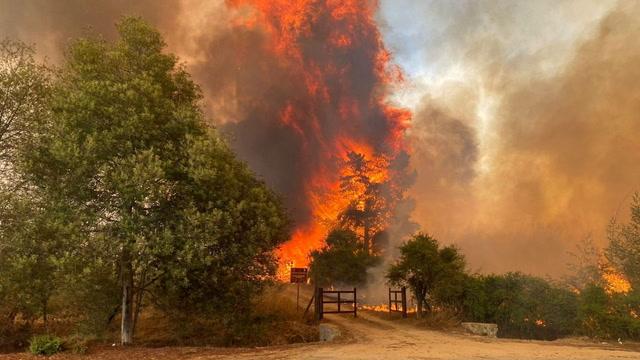
Mediterranean Region (Enmaeya News) — A powerful heatwave is spreading across the Mediterranean, causing dangerous wildfires and soaring temperatures in Southern Europe and parts of the Middle East. This extreme weather has led to emergency alerts and forced evacuations in multiple countries.
Fires and Evacuations Across Several Nations
On Sunday, wildfires broke out in Greece, Turkey, France, and Syria. Authorities in many other countries remain on high alert as meteorologists warn that the heatwave will intensify in the coming days. Officials from Spain to Italy have urged residents to take precautions, protect vulnerable groups, and limit unnecessary travel during the region’s first major heatwave this summer.
Emergency responders and ambulances are strategically placed near popular tourist destinations. Experts note that climate change is making such extreme heat events more frequent and severe.
Situation in Turkey and Syria
In Turkey’s Izmir province, strong winds fanned wildfires that ignited on Sunday. Firefighters, supported by aircraft, battled the blazes while five neighborhoods in Seferihisar district were evacuated as a safety measure.
Turkey has faced over 600 fires in the last week amid drought conditions. Interior Minister Ali Yerlikaya announced the arrest of 10 suspects believed to be involved in starting some of the fires. Sadly, the wildfires have claimed at least three lives in Izmir. Firefighters are also fighting a blaze in Hatay province’s Dortyol area.
In Syria, the wildfire situation has taken a particularly alarming turn, especially in the coastal province of Latakia, where intense heat and strong winds have caused fires to spread rapidly across forested hills and agricultural lands. The region, already battered by over a decade of conflict, faces a unique and dangerous complication: unexploded ordnance (UXOs) left behind from years of warfare. These dormant explosives have been detonating amid the flames, endangering both civilians and firefighting personnel and severely complicating containment efforts.
Local authorities, overwhelmed by the scale and complexity of the fires, have appealed for regional assistance. In a notable act of solidarity, Lebanon dispatched military helicopters to help battle the blazes, with Syrian and Lebanese crews working together under precarious conditions. The United Nations has also deployed assessment and emergency response teams to coordinate relief and evaluate the scale of destruction, especially in rural communities that rely heavily on agriculture and forest resources.
Fires in Greece and France
Greece has deployed more than 160 firefighters, 46 trucks, and five aircraft to control a wildfire in southern Evia that began late Friday. The fire destroyed forested land and forced two villages to evacuate. Additional fires were reported near Athens.
Meanwhile, France is facing wildfires in the Corbieres region of Aude, with temperatures soaring above 40°C (104°F). A historic abbey and a campsite were evacuated as a precaution. On Monday, Meteo France issued orange heat warnings for 84 out of 101 departments.
Heatwave Impact in Spain, Italy, and Portugal
Spain’s national weather agency, AEMET, recorded temperatures as high as 44°C (111°F) in Extremadura and Andalusia. Diego Radames, a 32-year-old Madrid photographer, told AFP: “I feel that the heat we’re experiencing is not normal for this time of year. Madrid just keeps getting hotter.”
Italy placed 21 cities—including Rome, Milan, and Naples—under red alert. Mario Guarino from the Italian Society of Emergency Medicine said emergency rooms have seen a 10% increase in heatstroke cases.
Portugal is also grappling with extreme heat. Lisbon was under a red warning until Monday night, and two-thirds of the country were on high alert for wildfires and dangerous temperatures. Sicily’s firefighters tackled 15 separate blazes on Saturday alone.
Environmental Impact and Climate Link
The rising frequency and intensity of heatwaves and wildfires across the Mediterranean are strongly tied to human-driven climate change. Pollution from industries, vehicles, and energy use has raised global temperatures, while poor land management, deforestation, and prolonged droughts have weakened natural defenses and left landscapes more vulnerable to fire.
Dry vegetation becomes highly flammable, and once fires start, they spread quickly and release large amounts of carbon dioxide, further worsening the climate crisis.
The environmental fallout is severe: ecosystems are destroyed, air quality declines, and local economies reliant on farming and tourism suffer. As Emanuela Piervitali from Italy’s Institute for Environmental Protection and Research told AFP, “Heatwaves in the Mediterranean have become more frequent and more intense in recent years. We’ll need to adapt to even higher extremes in the future.”
Lebanon’s Growing Vulnerability
Lebanon is particularly susceptible to the effects of intensified heatwaves and wildfires due to its declining annual rainfall and history of destructive forest fires. This year, rainfall levels have remained below average, exacerbating drought conditions and increasing the vulnerability of vegetation to ignition. The country has witnessed significant wildfire events in recent years, resulting in extensive ecological damage and economic repercussions for affected communities.
As climate change drives more frequent and severe heat extremes, Lebanon faces mounting challenges in safeguarding its natural landscapes, public health, and critical infrastructure. Proactive measures and strategic planning are essential to mitigate these growing risks and enhance the country’s resilience to future climate threats.
The Broader Consequences
This heatwave and the associated wildfires reveal the increasing risks posed by climate change. Mediterranean countries, already vulnerable to drought and fire, face growing threats to human health, safety, and natural ecosystems. Addressing these challenges requires immediate action and long-term adaptation strategies to protect lives and the environment.



